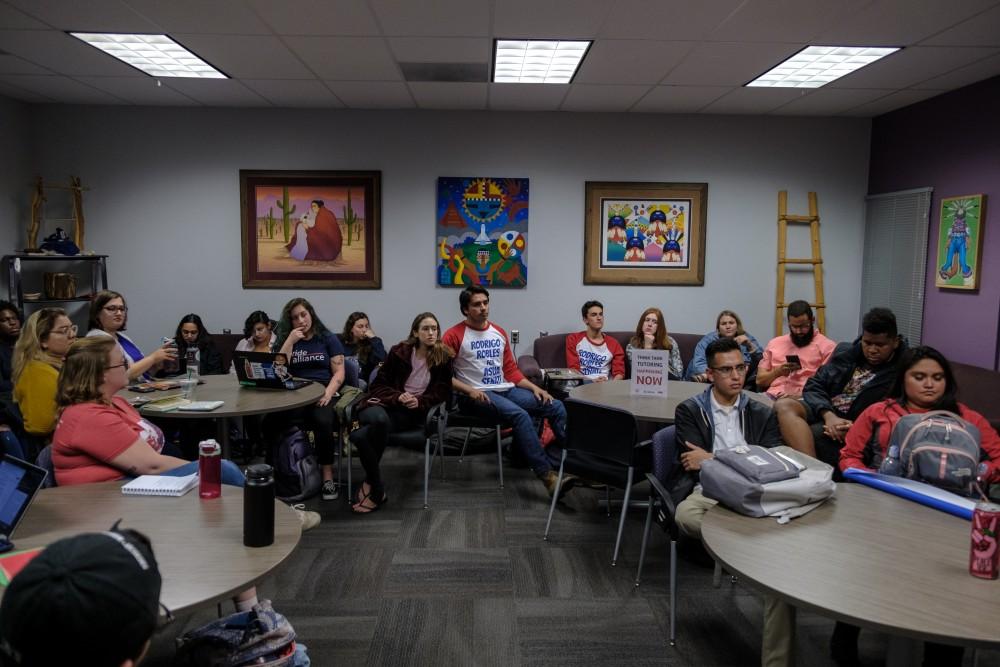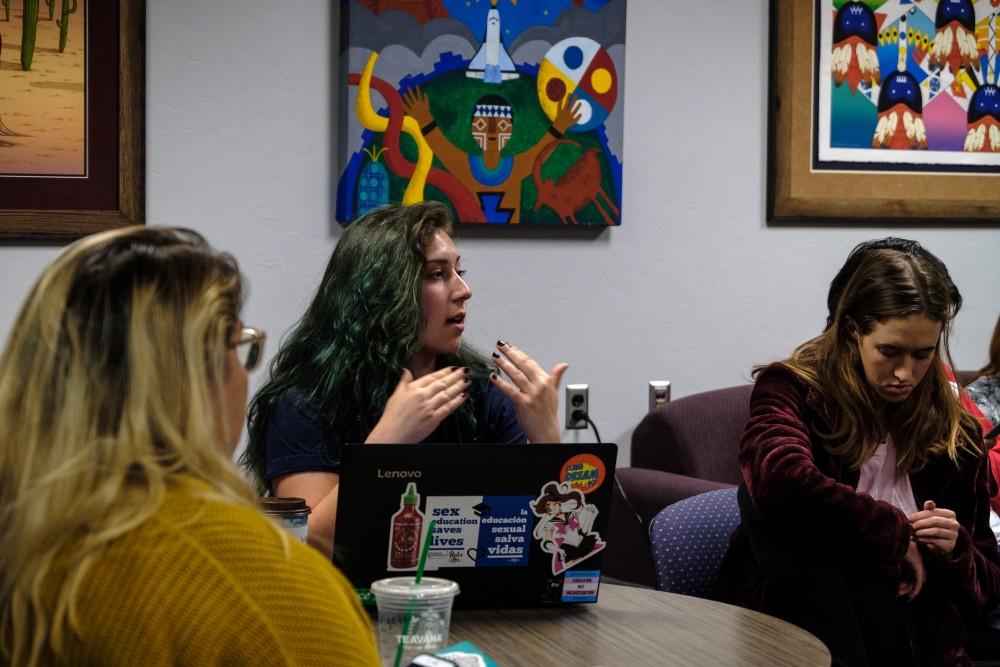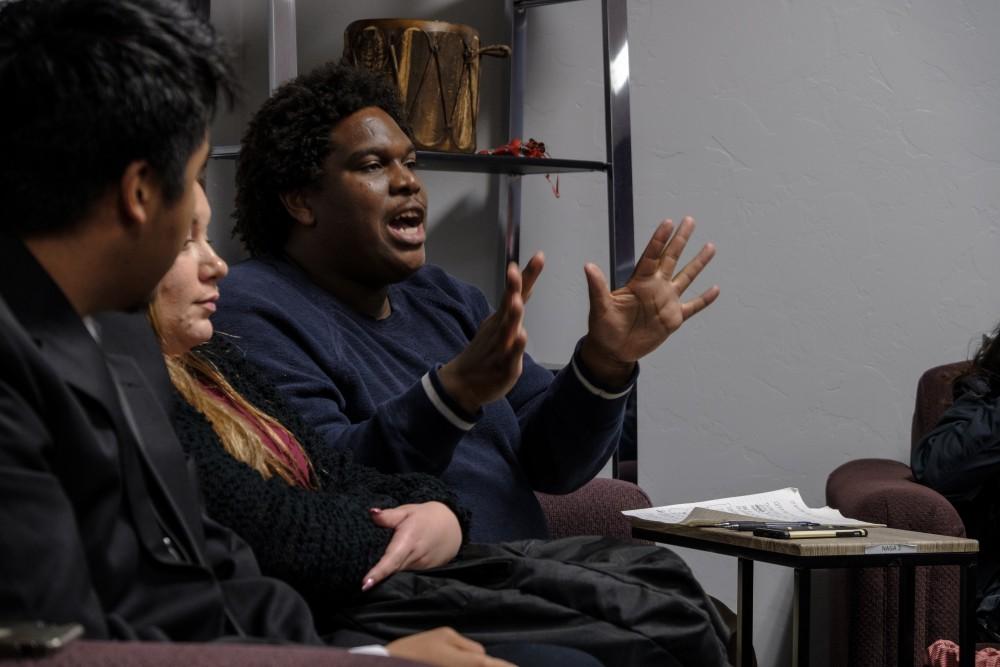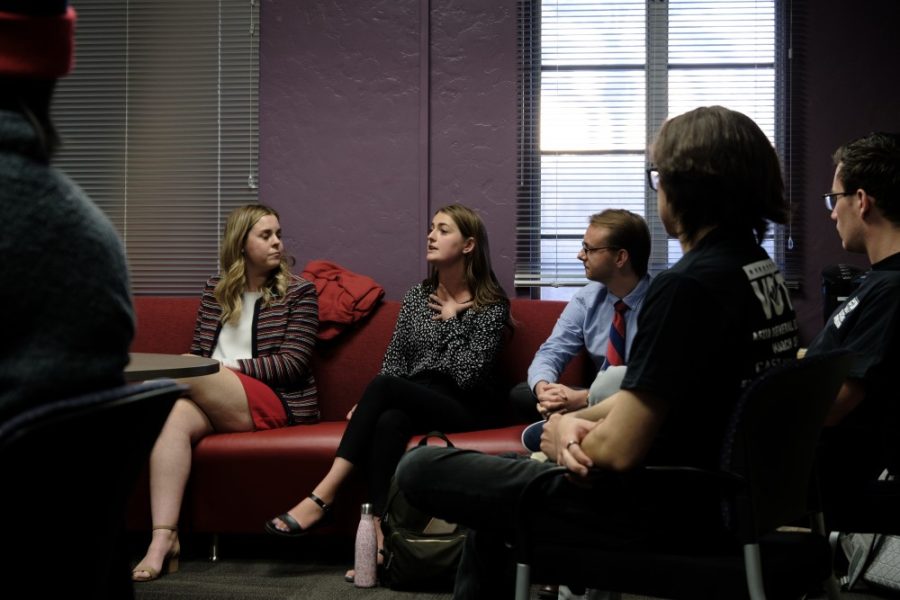Executive office candidates for the Associated Students of the University of Arizona hosted an open cultural forum on Wednesday, March 13. Students present expressed concerns over the lack of diversity in ASUA, the lack of candidates running and creating tangible solutions for prominent issues on campus.
Sydney Hess, candidate for ASUA student body president, Kate Rosenstengel, candidate for administrative vice president and Bennett Adamson, candidate for executive vice president, are all running unopposed.
RELATED: In ASUA’s upcoming election, only two positions have multiple candidates
Candidates’ platforms and positions
At the beginning of the forum, the candidates shared their platforms and goals for the upcoming year.
EVP candidate Adamson is currently the senator for the College of Social and Behavioral Sciences and is also on the Appropriations Board. The EVP is in charge of Senate meetings, oversees the appropriations board and registers clubs.
“I’d like to see Senate take a stronger stance on legislation and projects,” Adamson said. “Sometimes people question the utility of the Senate, but I think it’s an important legislative body.”
Rosenstengel is running again to keep her current AVP position. She was a member of the Freshman Class Council and a student body senator as a sophomore. As AVP, she works with the 12 programs of ASUA.
“I want to make sure people know what our programs and services are and what they do and how they’re involved with ASUA,” Rosenstengel said. “The second thing I want to work on is ‘I Will’ week. I don’t know what that looks like, but I want to make sure it has a place in ASUA.”
Hess is Rosenstengel’s current chief of staff. She has previously served as a student body senator and president of Freshman Class Council. Her three platforms are student advocacy, civic engagement and mental health awareness.
“I am in constant awe at directors’ councils and all of the amazing work that these people in ASUA are doing and the projects that they’re working on and just how excited and passionate they are,” Hess said. “I cannot wait to help support them in another capacity as student body president.”

Marlon Freeman, the ASUA Elections Commissioner, organized the event and asked all three candidates what they consider to be the biggest obstacle to achieving equity on campus.
Hess said the biggest obstacle is access to resources on campus, especially among minorities and marginalized groups.
“I’m not going to pretend as a white woman I know everything about everyone’s experience, because I don’t,” Hess said. Her goal is to reach out and let minority and marginalized groups have a seat at the table.
Rosenstengel said the main obstacle is how expensive college is.
“ASUA is only accessible to people from a certain financial background,” Rosenstengel said. “We [executives] do have a seat at that table when it comes to tuition discussion.”
She also mentioned how ASUA needs to be aware of students who have jobs but still want to be involved with ASUA.
Adamson agreed with Rosenstengel about working students and added they can often feel like small fish in a large pond.
“ASUA serves as a voice for the students,” Adamson said. There is a disconnect between what students want and what administrators think students want.”
His goal with Senate is to put senators in a position where they can interact with administration.
RELATED: ASUA cancels primary election citing low number of candidates
Community Concerns
Lexy Reyelts, co-director of Pride Alliance, commented many students from cultural centers were not at the forum and students are not accurately being represented by ASUA, where all three executive positions are going to be filled by white people.
“There’s no way you’re going to know what we’re going through, and I just feel it’s really disingenuine,” Reyelts said.

Nikki Mastrud, ASUA’s executive diversity director, said ASUA has a tendency to talk about problems but not act on them. They wanted a tangible solution the appointees could create.
Rosenstengel said as elected representatives, she expects people to come to ASUA and tell them about their problems. From there, they have direct access to UA President Dr. Robert Robbins and Dean of Students Kendal Washington White.
Hess said ASUA is currently not representative of the UA, but she wants to reach out to cultural centers.
“It’s about reaching out to cultural centers across campus to find people from different backgrounds,” Hess said.
Adamson said he is currently frustrated as a senator.
“ASUA needs to do more to be visible on campus,” he said. Adamson wants to see more town halls similar to the forum in the future.
Karlyn Bradley, a student who previously dropped out of UA, commented on the candidates’ remarks about tuition increase being inevitable.
“Saying that tuition just has to increase is unacceptable,” Bradley said. “I literally dropped out of school because I couldn’t afford it, and every single year you have a student government that claims to represent students be OK with raising tuition is unacceptable. You can’t say you care about marginalized students and also say it is OK for you all to support something that the university knows harms marginalized students. You cannot sit here and say both.”

Meucci Ilunga, a student representing Native American Student Affairs, asked the candidates how to get people to engage. Mastrud added that four of the six cultural centers on campus were not present at the forum.
“We are privileged students, so we don’t have the best lens about what’s going on and about how angry people are about the state our university is in,” Rosenstengel said.
Hess said that she has a lot to learn; she wants to know what concerns students have to help better meet their needs.
Adamson said he was unsettled because there were some issues mentioned in a list of student demands from 2016 that should have been informed about but was not for the forum.
Mastrud commented it felt disingenuous that people came to the forum to learn the candidates’ stances, but they ended up educating the candidates instead.
“It sounds like you are all dedicated to improving your knowledge, but it’s frustrating when we’re showing up to events and we’re educating,” Mastrud said. “So moving forward, just name events as they are, and that can affect what people show up.”
Bradley shared Mastrud’s frustration with the candidates.
“One of the things I find almost so offensive that it is laughable is the sense of entitlement to be completely ignorant to the experiences of people in the room and also the confidence to feel to be able to represent us,” Bradley said. “It’s fucking mindblowing.”
RELATED: ASUA looks to end semester with number of resolutions
Ilunga ultimately asked what goals the UA has to achieve to be able to say they’ve reached the end of their history.
Adamson said achieving three pillars fully would satisfy ASUA’s goal.
“The end goal is to have the ultimate expression of three things, so anybody has access to this education, and it’s affordable, and you feel like you have a place where you are safe and comfortable,” he said. Hess and Rosenstengel agreed with Adamson.
If you have questions for candidates, but are unable to attend future candidate meetings, email Marlon Freeman at asua-elections@email.arizona.edu.
For more election information, visit ASUA’s election website.
Follow Priya Jandu on Twitter









